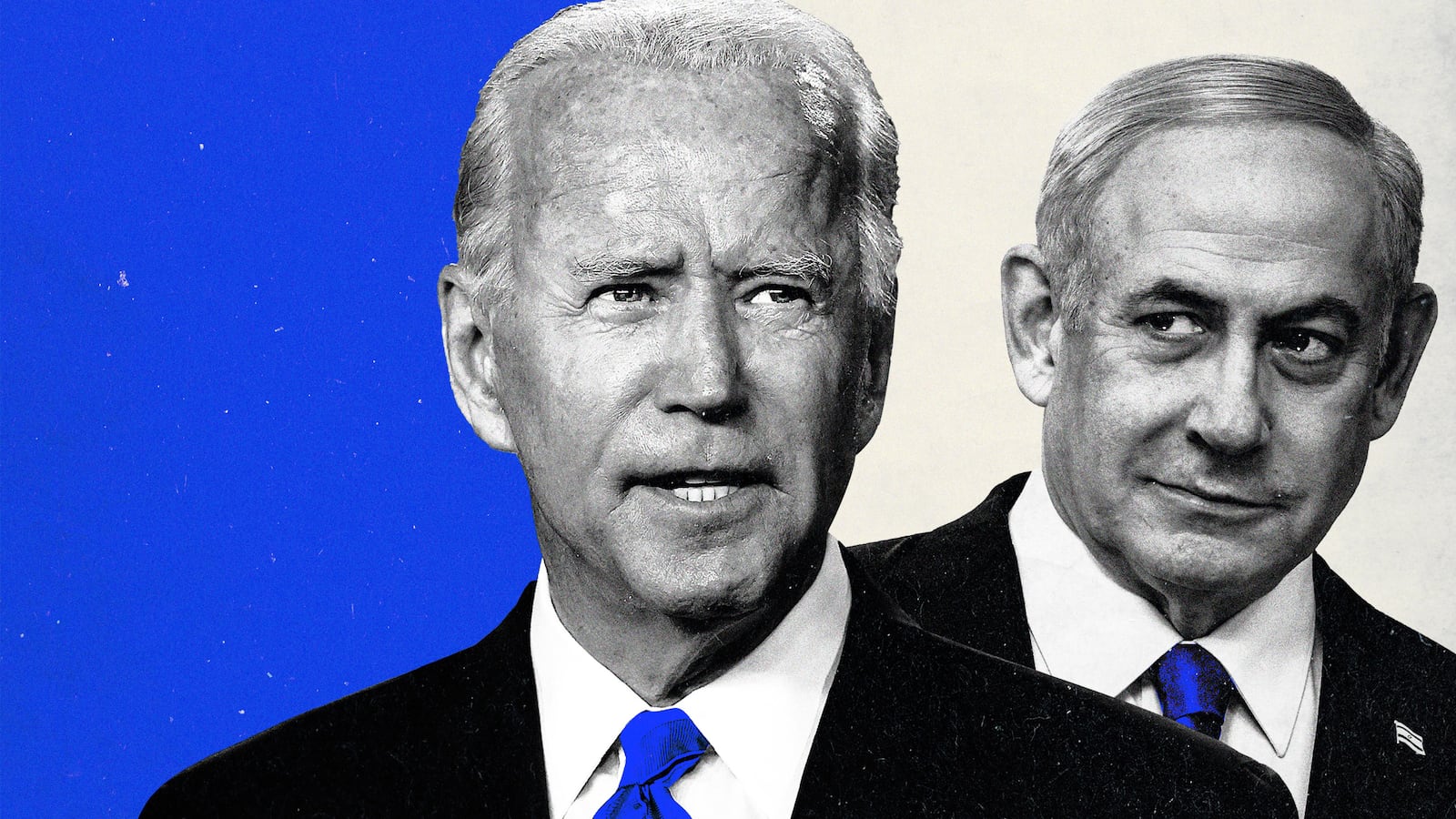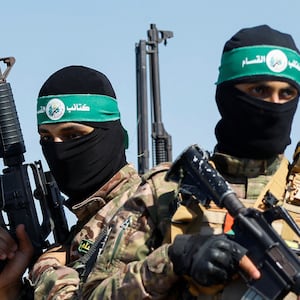Standing by Israel in the wake of this past weekend’s horrific attacks was the right thing for the Biden administration to do. Hamas committed massive, appalling crimes against humanity that require a resolute and unflinching response. However, whether America’s ultimate goal is greater security for the people of Israel, peace and stability in the region, or justice for the people of Palestine, it is essential that our support for Israel is not perceived to be a blank check by the Netanyahu government.
The U.S. and our international allies must use all the means at our disposal to ensure that the response of the Israelis to the crimes of Hamas is proportional, consistent with international law, and, most difficult of all, that ultimately it breaks the cycle of violence that has caused so much carnage for so long.
That, in turn, means sending a clear message that we will actively oppose extremist policies that are certain to lead to future violence from either Hamas or the Israeli leadership.
As we have seen, extremists seek extreme opposition. It is why, for example, Prime Minister Benjamin Netanyahu has said he would prefer having Hamas in charge among the Palestinians—because their radical policies “justify” his radical policies in response. It is why Hamas was also believed to prefer Netanyahu to his rivals.
It is what Osama bin Laden hoped to and did achieve in 2001. Our overreaction to the 9/11 attacks fueled terrorist recruitment across the Middle East, did untold damage to America’s reputation around the world, and made Americans far less willing to support U.S. military intervention—whether in Ukraine or the Middle East.
It is time we realized that the solution to the death and heartache in Israel and the Palestinian territories is not more violence, it is the strength and stability born of reason.
There are already clear signs that the Netanyahu government believes it can once again act with impunity in its attacks on Gaza. They have already initiated a siege, cutting off water, electricity, and food to Gaza, which is in violation of international law because it indiscriminately exacts a toll on innocent civilians. Israeli Defense Minister Yoav Gallant referred to Hamas fighters as “human animals,” a none-too-subtle way of dehumanizing the greater Palestinian population.

A destroyed car that was attacked by Palestinian militants lies by the road side on October 10, 2023 in Kfar Aza, Israel.
Amir Levy / GettyThe attacks on Gaza, a tiny enclave of 2.2 million, half of whom are children, are already exacting a brutal toll. And much darker days ahead are promised.
Some of this may viscerally feel right to Israelis who have lost relatives or watched as innocent civilians, children, and the elderly were dragged off and are being held hostage. But as the past decades have shown, retribution is not a strategy. It does not achieve security. If it did, the attacks of this past weekend would not have happened.

Israeli soldiers remove the bodies of civilians killed days by Hamas terrorists on this kibbutz near the border with Gaza, on October 10, 2023 in Kfar Gaza, Israel.
Amir Levy / GettyBecause America and Americans should be guided by our national interests and our commitments to our allies, it is essential we recognize that our first duty is to our fundamental values—values that so many of us associate with the region of the world in which the current fighting is taking place. It is by serving our values rather than formal ties to foreign governments or the rhetoric of alliances or even what we feel in our hearts in the heat of a moment, that we best advance our long-term goals of peace and justice.
While those ideas may seem simple enough, to implement them we have to recognize that for far too long we have ignored them. Too often the policies and actions of the United States, of Israel, and of the Palestinians in this conflict have been driven by other, more dangerous impulses. It is time to admit that all of our nations have historically valued the lives of our own people and those of our allies ahead of the lives of others. In one way or another, we have accepted either explicitly or by implication via our actions the kind of dehumanization of our adversaries or rivals—much in the same way Israel’s defense minister shamefully has.
It is those perverse rationalizations that during the 2014 Gaza war led to 2,251 Palestinians being killed, about half of whom were believed to be civilians and 551 were children; 66 Israeli soldiers and five civilians died in that conflict. How will that math work itself out this time?
The loss of at least 900 Israelis senselessly murdered on Oct. 7 is shocking. And yet, the loss of nearly half that number of Palestinians in the past couple of years (prior to this war) in West Bank violence barely registered in many U.S. policy circles.
The shock of the attacks may be greater, but the heartbreak, the loss to families, and the damage to the soul of the region were equally great in either case.
The nearly 3,000 people who died on 9/11 were not worth so much that the crime against them justified killing as many as 600,000 Iraqis in our misguided war against that country. There is no formula by which the death of innocent Palestinians justifies the deaths of innocent Israelis or vice versa.
In the past, when such flare-ups in the cycle of violence have occurred, the United States has followed a policy that amounted to, in the words of one former Israeli diplomat, “24 hours or a day or two of statements of solidarity followed by giving the Israelis roughly 96 hours to do whatever they felt they had to do, followed by calls for restraint.”
Not only is that approach flawed because it does not work, but it is wrong because it implicitly accepts the idea that our friends are entitled to a little overkill because their lives are worth more than those of their attackers. That wrong is then compounded when the U.S. government continues supporting and funding Israel—even as a government like Netanyahu’s comes into office intent on deepening that country’s apartheid, illegally seizing more settlements, gutting that country’s already shaky democracy, enforcing brutal racist policies, and doing so at the behest of a cabinet that includes people actually convicted by Israeli courts of terrorism.
Our failure to send a clear message to the Israelis that annexing more territory, deepening apartheid, and committing or tolerating crimes against Palestinians—especially our failure to follow such actions with concrete steps like withholding aid and materiel support—has actually contributed to the conflagration that has been sparked in Israel and Gaza this week.
While it is absolutely right that the abuses of the Netanyahu government do not justify the wholesale slaughter and kidnapping of innocent Israeli civilians, it is also certainly true that those abuses helped create the tensions that led to those crimes.

President Joe Biden speaks on the terrorist attacks in Israel alongside Secretary of State Antony Blinken on October 7, 2023.
Samuel Corum / GettyIt is also likely true that the Israeli-Saudi “normalization” agreement did little to remedy the injustices committed against Palestinians and helped set the stage for the attacks. Just as it was true that Iran no doubt supported the attacks because they would destabilize Israel and possibly derail that normalization deal that they see as a threat. Just as it was also true—and we must remember all these things can be and are true—that the Hamas terrorists who carried out the attack were guilty of monstrous crimes and must be held to account.
The lesson that comes from understanding the above is that the U.S. looked the other way when Israel was guilty of overkill in the past—our tradition of allowing them to kill or inflict suffering on Palestinians so long as it was slow enough not to attract headlines in the U.S. has helped bring us to where we are. Should we now, in the midst of the understandably heated emotions of this moment, allow them to follow these patterns again, we know where that will lead.
They may kill the leaders of Hamas. But new leaders will emerge, new radicals will be born from the rubble of Gaza. And we must recognize also that to some degree, this is just what the extremists in charge of the Israeli government seek, because it justifies their extremism. And it is what the leaders of Hamas are counting on.
The past eight decades have proven conclusively that there are no military solutions to the Israel-Palestine question. They have also proven that no other states in the region will step up to help solve that problem. This means it can only be addressed when both sides once again embrace and empower governments to seek political solutions.
That seems a long way off. But one way it can be made a more realistic objective is if the U.S., our allies, and other nations that care use the economic and political pressure at their disposal to say we will not tolerate or help to support in any way the abuses of the past.
If Hamas attacks Israelis, they and their sponsors will be and should be targeted and we should insist that they pay the full price that international law permits. By the same token, however, if Israelis strip away the rights or lives of Palestinians, they should see aid flows suspended. If extremists are empowered, we will work with them as practical considerations dictate we must, but we should not in any way support them. Further, if political solutions are sought, we should also commit to mobilizing the resources of the world’s leading nations to help reward those who are actual peacemakers and to invest in whatever peace may follow.
In the wake of atrocities, it is hard to be rational. But the failure of rationality in precisely moments like these that begets future atrocities. It does not help the Israeli people, nor does it advance U.S. interests to “show solidarity” by supporting, defending, or even simply tolerating the bad acts or instincts of the most incompetent, corrupt, and vile government in Israel’s history. Such a position dishonors the victims of Hamas and the rest of the people of Israel if it compounds the crimes with more crimes that make more senseless bloodshed more likely. It is not “loyal” to increase the likelihood of more, not fewer, October 7ths.
Standing with Israel, in fact, means both supporting forceful targeted actions against the Hamas terrorists responsible for the nauseating horrors of this past weekend and also taking a stance against actions by the Israeli government that make peace less likely. In fact, because only a political solution that grants full right of self-determination to the Palestinian people grants Israelis real security, standing with the people of Israel means standing with the people of Palestine—and, given their records to date, against both the Hamas and Netanyahu governments.









